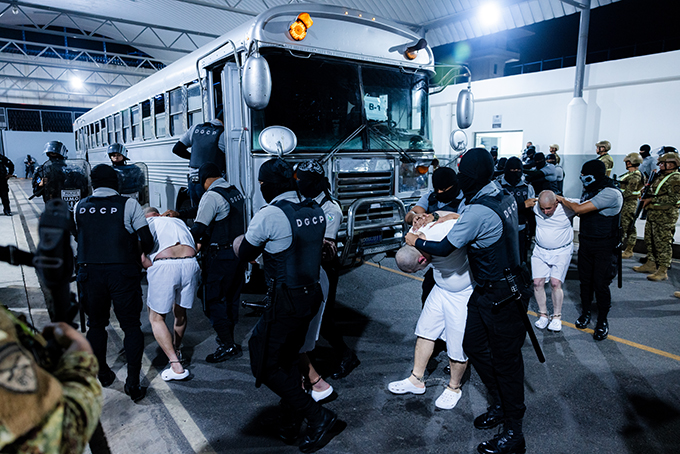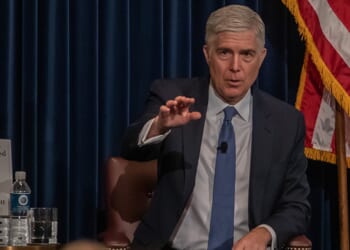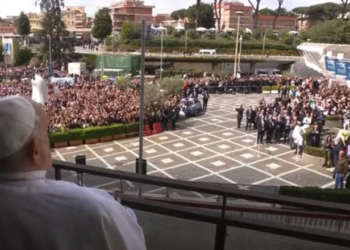With its order halting deportations to El Salvador at 1:00 a.m. on Saturday, the Supreme Court has intervened in the battle between the Trump administration and federal courts over immigration rights. As the justices examine whether the government can remove alleged Venezuelan terrorist gang members from American territory, they will revisit a series of cases stemming from the last major clash between a White House’s national security priorities and aliens’ alleged constitutional rights: the Bush administration’s decision to hold terrorists at Guantanamo Bay after 9/11.
As an official in the Justice Department’s Office of Legal Counsel at the time, I took part in the decisions that followed the core choice to treat the 9/11 attacks as acts of war rather than grandiose crimes. Like the Trump administration today, the Bush Justice Department adopted aggressive legal positions rooted in past wartime precedents—positions unfamiliar to most Americans, who had not seen a direct attack on U.S. soil since World War II. Ultimately, the Supreme Court upheld the government’s authority to adopt a wartime legal posture in response to 9/11 and the broader war on terrorism. But it also ruled that the Due Process Clause required meaningful distinctions in how the government treated citizens and non-citizens, depending on where U.S. forces encountered them.
Finally, a reason to check your email.
Sign up for our free newsletter today.
Comparing 2001 with 2025 reveals stark differences that suggest today’s Court may reject key aspects of the Trump immigration agenda. If it learns the lessons of the Bush experience, the Trump administration can avoid a needless confrontation with the most conservative Supreme Court in a century. The Court’s conservative majority—in particular, Justices Neil Gorsuch, Brett Kavanaugh, and Amy Coney Barrett—would support giving the president broad discretion to fight a real war, within the limits of the Constitution.
On the campaign trail, candidate Donald Trump pledged to use the 1798 Alien Enemies Act (AEA) to deport violent gangs of illegal aliens. On March 15, President Trump delivered on his promise, ordering the removal to El Salvador of about 300 illegal Venezuelan aliens suspected of belonging to the Tren de Aragua (TdA) gang. A D.C. federal trial judge sought to block the flights while they were airborne; controversy still swirls over whether the White House defied that order. The D.C. federal appeals court upheld the order, but the Supreme Court quickly reversed it. The Court found that the trial court lacked jurisdiction and that challenges to deportation had to be filed in Texas and Louisiana (where the Venezuelans were last located on American territory). But importantly, it also held that the Venezuelans had a right to due process before a federal judge to challenge the constitutionality and factual basis for their deportation.
The AEA authorizes the president to detain and expel aliens from a “hostile nation or government” with which the United States is either in a “declared war” or has suffered an “invasion or predatory incursion.” Before now, the U.S. had invoked the act only during the War of 1812 and World Wars I and II. In his order sending Venezuelans to El Salvador, Trump asserted that TdA—designated by the U.S. as a foreign terrorist organization—was conducting an invasion or predatory incursion through “irregular warfare,” including drug trafficking and mass illegal migration. The AEA also requires that the threat come from a “hostile nation or government,” a condition the administration argued was met because TdA is “closely aligned with, and indeed has infiltrated,” the Venezuelan government.
The Trump White House is thus making the extraordinary claim that a gang has risen to the level of a foreign government conducting an invasion or predatory incursion into the U.S. Robert Delahunty and I have argued that proving this would be difficult in court. It would depend on the facts of the Venezuelan government’s control over TdA, and on whether international criminal activities can legally constitute a military threat to national security. We have also questioned, however, the extent of courts’ competence in assessing whether the U.S. is being invaded by Venezuela. The Supreme Court has never second-guessed another branch’s decision that a war or invasion occurred.
Despite its early victory at the Court, the Trump administration continues to suggest that it owes no due process to the Venezuelans. This directly contradicts an important concession it made in the case—that any alien on U.S. territory has a right, whether under the AEA or regular immigration law, to a hearing before a federal judge before deportation.
The administration is taking a similarly aggressive stance in the case of Kilmar Abrego Garcia. The Department of Homeland Security sent Garcia to El Salvador by mistake, without a hearing; now, the administration says that it has no legal responsibility to arrange his return. Vice President J. D. Vance slammed those “weeping over the lack of due process” for seeking “through fake legal process” to achieve “the ratification of Biden’s illegal migrant invasion.”
After 9/11, the Bush administration took a very different approach. We were confronted by a war whose existence was obvious to everyone except the ACLU and misguided law professors. The rules of war permit the capture and detention of the enemy without trial. The purpose of detention in such cases is not punishment, but removal of enemy combatants from action. Warring nations have always been permitted to imprison the enemy until the end of a conflict. In the summer of 2004, the Supreme Court recognized this explicitly in Hamdi v. Rumsfeld, which acknowledged that “detention to prevent a combatant’s return to the battlefield is a fundamental incident of waging war.”
As the United States pursued al-Qaida into Afghanistan and Pakistan in the months after the 9/11 attacks, it detained four categories of enemy combatants. We held aliens, such as al-Qaida and Taliban fighters, encountered in operations outside the United States. We captured U.S. citizens who had fought or associated with our enemies abroad, such as John Walker Lindh (the “American Taliban” captured in Afghanistan). We detained aliens who tried to carry out terrorist attacks within the United States, such as Richard Reid, the so-called Shoe Bomber. Finally, we arrested Americans who sought to carry out terrorist attacks in the United States on al-Qaida’s behalf, such as Jose Padilla, who had ventured to meet high-ranking al-Qaida leaders in Afghanistan and Pakistan before returning to the U.S.
These enemy combatants posed difficult challenges for the Bush administration—challenges the U.S. had not faced since World War II. Unlike earlier American wars fought entirely on foreign soil, the conflict with al-Qaida had global reach, including inside the United States; in fact, it began with direct attacks on New York City and Washington, D.C. But warfare on U.S. soil is not without precedent. During the Civil War, every enemy combatant was also an American citizen. In World War II, some Americans joined the German, Italian, or Japanese armies. When captured, these citizens were treated as enemy combatants and denied access to the protections of the American criminal justice system. They were not tried for crimes but held until the war’s end.
The Bush Justice Department made important distinctions in its litigation before the courts. We agreed that every enemy combatant captured within the United States, alien or citizen, would receive some form of due process. While we argued successfully that the president could decide whether that would take the form of a trial for a crime or for detention as an enemy combatant, we conceded that any alien or citizen had a right to a habeas corpus hearing before a federal judge. Similarly, we agreed that we would return American citizens captured abroad to our territory, where they, too, would receive due process. But we maintained that, as in keeping with past wars, aliens captured abroad enjoyed no constitutional rights.
Indeed, the Court had previously held in United States v. Verdugo-Urquidez (1989) that the Bill of Rights did not apply to aliens outside the United States because they were not part of the “we the people,” who benefit from the Fourth Amendment. Further, the Court found that allowing such claims “would have significant and deleterious consequences for the United States in conducting activities beyond its boundaries”—not just in drug cases, as in Verdugo-Urquidez, but for its use of the armed forces abroad “for the protection of American citizens or national security.”

After reaching those agreements with the courts, the question remained whether the Guantanamo Bay base, where the Bush administration had held captured al-Qaida and Taliban fighters, fell outside U.S. territory. We believed that we were comfortably within existing Supreme Court precedent in concluding that enemy combatants held in Cuba were legally identical to prisoners held in Afghanistan.
In Johnson v. Eisentrager (1950), the Supreme Court had refused to entertain a habeas petition brought by German World War II prisoners who challenged their trial and conviction by the military commission for war crimes. The German defendants had been captured continuing to fight against the Allies in China, after their country had surrendered; they were convicted and imprisoned in occupied Germany and never entered the territorial United States. Only American citizens (anywhere in the world) and aliens who enter American territory enjoyed “the privilege of litigation” in American courts, the Eisentrager Court held, because “their presence in the country implied protection.” Deferring to the political branches’ decisions on prisoners of war was warranted, because “trials would hamper the war effort and bring aid and comfort to the enemy” and engender “conflict between judicial and military opinion.”
Nevertheless, the Supreme Court found that Congress had intended the courts to consider Guantanamo Bay within federal courts’ jurisdiction. In Rasul v. Bush (2004), the Court held that foreign nationals detained in Guantanamo Bay had habeas corpus rights in U.S. courts. In response, Congress passed a series of laws overruling the Court’s verdict and vindicating the Bush Justice Department’s claim that American courts’ jurisdiction did not extend to Guantanamo Bay. Then, in Boumediene v. Bush (2008), the Supreme Court took the extraordinary step of saying that both the president and Congress had acted unconstitutionally, that the federal courts would unilaterally exercise jurisdiction over Guantanamo Bay, and—for the first time in American history—order due-process hearings for enemy combatants. Congress then created a system of military courts to hear Guantanamo prisoners’ claims, which ultimately led to the U.S. federal courts in Washington, D.C. for review.
The Bush administration’s experience with the federal judiciary after 9/11 reveals important vulnerabilities in the Trump administration’s approach to the immigration cases now moving toward the Supreme Court.
First, both President Bush and Congress agreed that the 9/11 attacks constituted an act of war—Bush declared as much in his televised remarks on the evening of September 11, 2001, and Congress affirmed it in its Authorization for Use of Military Force passed on September 18, 2001. In the current situation, Congress has not endorsed President Trump’s determination that the United States is at war with Venezuela, nor has it found that the Maduro regime is directing a TdA-led invasion. Without such backing, courts may be less inclined to defer to Trump’s claim that a state of war exists.
Second, the Trump administration has failed to follow the plain text of the Due Process Clause. Both the Bush and the Trump administrations agreed that enemy aliens held outside the territorial United States do not have constitutional rights. But the Bush White House also followed Supreme Court precedent in recognizing that due process rights attached to anyone—citizen or alien—held within the United States. The Trump administration appears to disagree with this rule. Not only did it send the first flight of Venezuelans to El Salvador without due process, but it continues to struggle with district court judges over the rights of future deportees.
The Trump administration is entitled to interpret the Constitution for itself and to seek to persuade the judiciary to change its mind. But the constitutional text clearly grants the right of due process to all “persons” within the United States; even if those rights are less than those guaranteed in a criminal trial, they still require a hearing before a federal judge.
Third—and most important—the Bush administration made clear from the outset that it would respect and enforce Supreme Court rulings. Officials at the Bush Justice Department believed that enemy aliens held at Guantanamo Bay had no constitutional rights, based on a line of Supreme Court cases dating back to World War II. Even though, in our view, the Court later changed the legal framework for wartime detentions, the administration still operated within the boundaries the Court set. By contrast, Trump administration officials have questioned the legitimacy of the judiciary, called for the impeachment of trial judges, and, in some cases, had political allies suggest that the president could defy Supreme Court decisions.
This makes little sense. President Trump’s immigration agenda has been a stunning success. According to Customs and Border Protection figures, encounters at the southwestern border with illegal aliens fell from a peak of 302,000 in December 2024, at the height of the Biden administration’s lax immigration policies, to a low of 7,200 last month. Fighting the federal judiciary was not instrumental to achieving this outcome.
The Trump administration may believe that battling pro-immigration groups in court boosts its political standing. Polls suggest that immigration is one of the few major issues on which most Americans think Trump is doing a good job. But this posture risks alienating a conservative Supreme Court whose support the White House will need to achieve other key objectives.
Trump’s efforts to shrink the administrative state, restore a stronger role for the states, and uphold a colorblind Constitution and robust protections for religious liberty all depend on the Court’s endorsement. One of the surest ways to jeopardize those goals is to challenge the Court’s authority—and that’s the direction Trump risks taking unless he changes course.
Top Photo by Eric Draper/The White House/Getty Images News via Getty Images
Source link
















